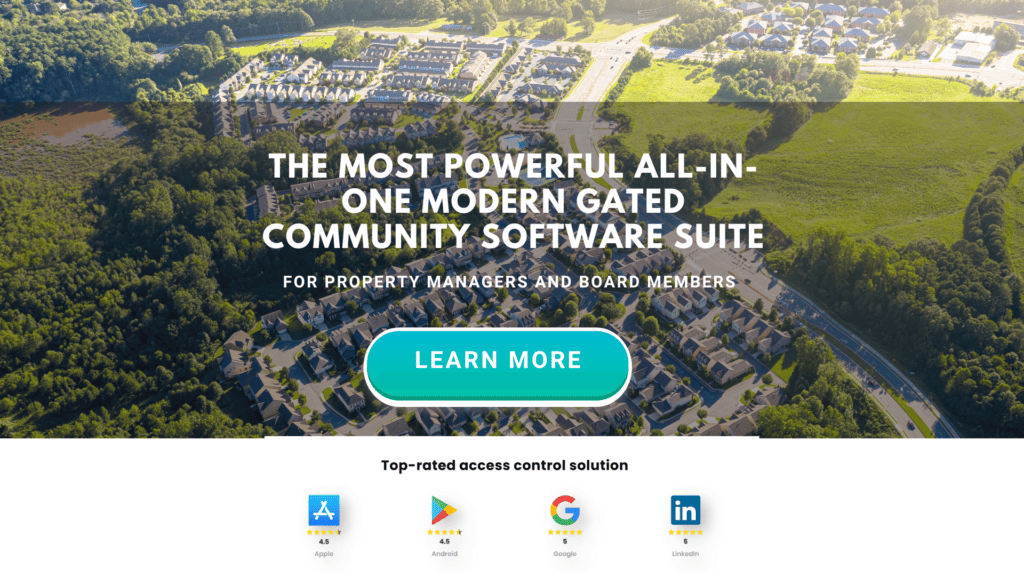Managing parking and visitor access is one of the most persistent challenges facing residential communities today. Whether it’s a suburban HOA, a gated neighborhood, or a resort-style development, the parking lot has often become a daily point of frustration. Limited guest spaces, unauthorized vehicles, enforcement gaps, and administrative burdens all strain operations and affect the resident experience.
Solutions like Parking Boss have modernized parts of the parking process, offering digital tools for guest registration and parking permit management. However, parking still often operates separately from broader visitor management and access control systems without making use of digital parking permits. The next logical step is integration—creating a unified, seamless platform that addresses both parking and security together known as an Integrated Parking Management System.
Communities that embrace this integrated approach will improve operational efficiency and lay the groundwork for stronger security, better data oversight, and potential new revenue opportunities.
Let’s dive in.
- Traditional Systems vs. Integrated Possibility
- What a Unified Platform Could Look Like
- Conceptual Comparison: Parking Boss vs Unified Platform
- Short-Term Rental Use Case
- Parking Revenue as a Future Opportunity
- The Future is Integration
Traditional Systems vs. Integrated Possibility
Most communities still manage parking and visitor access using a patchwork of standalone tools. A spreadsheet here, a parking permit app there, and a manual gate log somewhere else. Even solutions like Parking Boss, while useful for parking enforcement, operate independently from visitor management and access control.
This lack of integration creates several issues.
Siloed Information
When parking management and visitor access control operate as two separate systems, it creates unnecessary complexity. Staff must log into different platforms to gather information, increasing the chance of missed details and mistakes.
Important data like a visitor’s access history or a resident’s parking usage can fall through the cracks, leading to weaker enforcement and confusion during incident investigations. Integrated systems solve this by combining all access and parking data into one, clear view while also setting max guest limits with visitor pass and parking management.
Manual Enforcement
In many communities, enforcement still depends heavily on human patrols or residents reporting violations. Without smart parking enforcement tools, spotting unauthorized vehicles or overstays becomes time-consuming and inconsistent.
Such a reactive approach often allows violations to go unnoticed until they become major complaints. With automated license plate checks and real-time parking analytics, staff can proactively monitor compliance without relying entirely on physical patrols.
Incomplete Data
When parking and access systems don’t communicate, it becomes difficult to trace a visitor or vendor’s complete journey. Managers may know when someone entered the property, but not where they parked or how long they stayed.
With an incomplete picture, it’s harder to enforce community rules or reduce unauthorized parking in residential communities. Visitor management with parking integration fills in these gaps, providing a full record from gate entry to parking activity in one system.
Missed Revenue
Standalone parking tools often stop at issuing permits without fully integrating payment collection and tracking. In turn, the community’s ability to properly charge for guest parking, overflow parking, or short-term rental visitor access is limited.
As a result, potential revenue is lost, and manual payment tracking becomes a burden. Integrated systems make it easy to automate charges, offer digital payment options, and ensure every authorized space is properly accounted for and billed.
As communities look to become more efficient and resident-focused, the idea of managing parking in isolation feels increasingly outdated. An integrated system offers a smarter alternative.
What a Unified Platform Could Look Like
Imagine a system where parking, visitor management, and access control are all handled in one place. A true integrated platform would build on current strengths, like real-time dashboards and license plate recognition (LPR), and seamlessly extend them into parking management.
Key features could include the following.
Combined Visitor Pass and Parking Permissions
An integrated system allows residents to assign both gate access and parking permissions in one simple step when registering a guest. Instead of juggling separate approvals for entry and parking, everything is linked to a single digital credential.
This improves efficiency, reduces miscommunication, and ensures that guests have the correct permissions for both entering the community and parking their vehicles in designated spaces.
Secure Digital Payments
If a community charges for guest parking, an integrated system can make the payment process seamless. Guests receive a secure link tied directly to their digital pass, allowing them to pay for parking online before arriving. A digital, proactive approach eliminates the need for cash handling, paper receipts, or on-site payment terminals, making revenue collection easier and helping track payments properly.
LPR-Enabled Tracking
License Plate Recognition (LPR) technology plays a key role in enforcement and convenience. Cameras capture and verify vehicle plates at the gate and within the property, confirming that each car matches its assigned parking credentials.
Automated checks reduce the chances of unauthorized parking, support real-time monitoring, and strengthen the overall security of the community.
Real-Time Visibility
An integrated dashboard gives property staff and management live insights into parking activity. They can instantly see which guest and resident vehicles are on the property, where they are parked, and whether any violations are occurring. Real-time visibility allows for faster decision-making and helps management spot potential issues before they become problems.
Automated Alerts
If a guest overstays their permitted parking duration, parks in the wrong area, or attempts unauthorized entry, the system can trigger immediate notifications. Automated alerts reduce reliance on manual patrols and allow enforcement teams to respond quickly. Rule compliance then improves without significantly increasing staffing needs or operational costs.
Simplified Administration
Managing parking, visitor access, and resident credentials no longer requires multiple systems or logins. An integrated platform brings everything together under one dashboard, providing a single source of truth. Property managers can issue passes, update parking permissions, review access logs, and track payments all in one place, dramatically reducing administrative overhead and improving overall accuracy.
Rather than relying on disjointed apps and manual interventions, an integrated system transforms parking into a natural extension of overall community security.
Conceptual Comparison: Parking Boss vs Unified Platform
To better understand the differences, here’s a simple breakdown:
| Feature | Parking Boss | Unified Platform Vision |
| Guest Parking Registration | Yes | Yes |
| Resident Permit Management | Yes | Yes |
| Digital Parking Permits | Yes | Yes |
| Visitor Management Integration | No | Yes |
| License Plate Recognition (LPR) | No | Yes |
| Access Control System Integration | No | Yes |
| Real-Time Violation Tracking | Limited | Fully Integrated |
| Unified Dashboard for All Access | No | Yes |
| Payment Collection for Parking | Yes | Yes |
| Short-Term Rental Parking Support | Yes | Yes |
A fully unified platform bridges the gaps between parking, visitor management, and community security.
Short-Term Rental Use Case
Short-term rental (STR) communities are an ideal example of where automated parking compliance can really make a difference. These communities often face rotating guests, inconsistent parking behavior, and frequent complaints about unauthorized vehicles.
An integrated solution would allow:
- Hosts to issue guest passes tied to both parking and access permissions.
- Visitors to pay parking fees securely at the time of booking.
- LPR systems to monitor and validate each vehicle in real time, from entry to assigned spaces.
- Property managers to view live reports, spot issues early, and enforce rules without constant patrolling.
The benefits for short-term rental communities are clear: fewer resident complaints, stronger rule enforcement, better financial tracking, and a smoother guest experience.
Open Up Parking Revenue Opportunities
One of the overlooked benefits of smarter parking management is revenue generation. Many communities already charge for guest passes, overnight parking, or vendor access, but manual collection makes it inefficient and prone to errors.
Parking revenue generation tools would allow communities to automate parking payments, link charges directly to digital guest passes, and easily track all transactions.
Potential revenue streams include:
- Daily guest parking permits
- Weekly or monthly vendor parking fees
- Overflow parking charges for residents
Beyond revenue collection, this transparency builds trust with residents by clearly showing how parking spaces are allocated and managed.
The Future Is Integration
As residential communities grow more sophisticated, the demand for truly unified systems will continue to rise. Parking management cannot be treated separately from visitor management or gate access if communities want to operate efficiently and securely.
The future lies in integration: systems that share data, automate tasks, and create a cohesive experience for residents, guests, and staff. For communities prioritizing the optimization of their visitor management and access control, expanding into integrated parking management is the next logical step.
Proptia is a single sign-on platform that features visitor scheduling, license plate recognition, real-time dashboards, and automated access control—all the essential pieces needed to build a truly seamless system.
Adopt the Smarter Approach to Parking and Visitor Management
Managing parking and visitor access doesn’t have to be complicated. Moving toward integrated systems can help communities eliminate administrative headaches, improve security, generate revenue, and create a better experience for everyone who lives or visits there.
As technology continues to evolve, communities that embrace integration will be better positioned for growth, safety, and resident satisfaction.
To find out how to integrate visitor management with parking enforcement, stay updated on how Proptia is expanding into parking management solutions, visit Proptia.com, and subscribe to future updates.
Proptia is a leading provider of visitor management and access control solutions for HOAs, resorts, and residential communities across North America.


